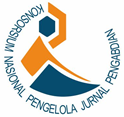Peningkatan Inovasi Pembelajaran Melalui Pengembangan Konten Pembelajaran Daring
Abstract
Pandemi Covid-19 membawa pada sebuah tantangan global dan berdampak pada sektor Pendidikan. Kebijakan physical dan social distancing membuat aktivitas pembelajaran harus dilakukan secara daring dengan memanfaatkan teknologi dan media pembelajaran. Faktanya, masih banyak pendidik dan fasilitas sekolah yang tidak siap dalam menghadapi perubahan ini. Kegiatan ini bertujuan untuk memberikan pendampingan kepada guru sebagai aspek penting dalam penyelenggaraan pendidikan dituntut untuk memahami dan memilih metode dan model pembelajaran daring yang tepat. Kegiatan ini dilakukan dengan melakukan diskusi grup dan pelatihan dengan memperhatikan protocol Covid-19. Hasil pelaksanaan kegiatan ini telah membantu guru dalam mengembangkan pembelajaran yang inovatif dan praktek pembuatan konten pembelajaran. Antusiasme guru guru sangat tinggi dalam kegiatan ini untuk membuat konten pembelajaran yang berkualitas bagi siswa.
Kata Kunci: inovasi pembelajaran, pembelajaran daring, media pembelajaran.
Abstract
Covid-19 pandemic has been a global challenge and it has impacted to educational sector. Since the implementation of physical and social distancing, it drives to movement from conventional model to online learning activities by adapting technology. In fact, many educators and school facilities are not ready with this remarkable condition. This project aims at assisting educators in using online learning activities and providing innovative learnings to obtain same benefits like normal situation. This activity is carried out by conducting group discussions and training with due regard to the Covid-19 protocol. The results of the implementation of this activity have helped teachers in developing innovative learning and learning content creation practices. The teacher's enthusiasm is very high in this activity to create quality learning content for students.
Keywords: Learning innovation, online learning, learning medium, students accomplishment.
Full Text:
PDFReferences
Basham, J. D., Blackorby, J., & Marino, M. T. (2020). Opportunity in Crisis: The Role of Universal Design for Learning in Educational Redesign. Learning Disabilities: A Contemporary Journal, 18(1), 71-91.
Chetty, R., Friedman, J. N., Hendren, N., & Stepner, M. (2020). How did covid-19 and stabilization policies affect spending and employment? a new real-time economic tracker based on private sector data (No. w27431). National Bureau of Economic Research.
Firman, F. (2020). Dampak Covid-19 terhadap Pembelajaran di Perguruan Tinggi. BIOMA: Jurnal Biologi dan Pembelajarannya, 2(1), 14-20.
Hasan, N., & Bao, Y. (2020). Impact of “e-Learning crack-up” perception on psychological distress among college students during COVID-19 pandemic: A mediating role of “fear of academic year loss”. Children and Youth Services Review, 118, 105355.
Jamal, S. (2020). Analisis Kesiapan Pembelajaran E-Learning Saat Pandemi Covid-19 Di Smk Negeri 1 Tambelangan. Jurnal Nalar Pendidikan, 8(1), 16-22.
Li, D. C., & Tsai, C. Y. (2020). An Empirical Study on the Learning Outcomes of E-Learning Measures in Taiwanese Small and Medium-Sized Enterprises (SMEs) Based on the Perspective of Goal Orientation Theory. Sustainability, 12(12), 5054.
Nicola, M., Alsafi, Z., Sohrabi, C., Kerwan, A., Al-Jabir, A., Iosifidis, C., ... & Agha, R. (2020). The socio-economic implications of the coronavirus and COVID-19 pandemic: a review. International Journal of Surgery, 78, 185-193.
Radha, R., Mahalakshmi, K., Kumar, V. S., & Saravanakumar, A. R. (2020). E-learning during lockdown of Covid-19 pandemic: a global perspective. International journal of control and automation, 13(4), 1088-1099
Rafiola, R., Setyosari, P., Radjah, C., & Ramli, M. (2020). The Effect of Learning Motivation, Self-Efficacy, and Blended Learning on Students’ Achievement in The Industrial Revolution 4.0. International Journal of Emerging Technologies in Learning (iJET), 15(8), 71-82.
Scull, J., Phillips, M., Sharma, U., & Garnier, K. (2020). Innovations in teacher education at the time of COVID19: an Australian perspective. Journal of Education for Teaching, 1-10.
Siron, Y., Wibowo, A., & Narmaditya, B. S. (2020). Factors affecting the adoption of e-learning in Indonesia: Lesson from Covid-19. Journal of Technology and Science Education, 10(2), 282-295.
Syakur, A., Musyarofah, L., Sulistiyaningsih, S., & Wike, W. (2020). The Effect of Project Based Learning (PjBL) Continuing Learning Innovation on Learning Outcomes of English in Higher Education. Budapest International Research and Critics in Linguistics and Education (BirLE) Journal, 3(1), 625-630.
Wijaya, T. T. (2020). How chinese students learn mathematics during the coronavirus pandemic. IJERI: International Journal of Educational Research and Innovation, (15), 1-16.
Wu, D., Bieber, M., & Hiltz, S. R. (2019). Engaging students with constructivist participatory examinations in asynchronous learning networks. Journal of Information Systems Education, 19(3), 9.
Yustina, Y., Syafii, W., & Vebrianto, R. (2020). The Effects of Blended Learning and Project-Based Learning on Pre-Service Biology Teachers’ Creative Thinking Skills through Online Learning in the Covid-19 Pandemic. Jurnal Pendidikan IPA Indonesia, 9(3), 408-420.
Zuvic-Butorac, M., Rončević, N., Nemčanin, D., & Nebić, Z. (2011). Blended e-learning in higher education: Research on students’ perspective. Issues in Informing Science and Information Technology, 8, 409.
Zydney, J. M., Warner, Z., & Angelone, L. (2020). Learning through experience: Using design based research to redesign protocols for blended synchronous learning environments. Computers & Education, 143, 103678.
DOI: http://dx.doi.org/10.17977/um045v4i1p%25p
Refbacks
- There are currently no refbacks.
Email: karinov@um.ac.id

This work is licensed under a Creative Commons Attribution-ShareAlike 4.0 International License.






